
Persona 3 Reload - Episode Aigis makes me finally appreciate The Answer
The following will contain spoilers for the base game content of Persona 3.
Persona 3 Reload is what allowed me truly “get” Persona 3. To an extent I love all of these games, but before the remake this year, I struggled to enjoy previous iterations of Persona 3. Sandwiched between all these games I adore was this odd one out that should have been for me, but it never quite clicked. A modern coat of paint, a reframing of its core cast, and an uplift to its battle system brought it from my least liked to probably my favorite. I’ve never been more primed to appreciate Persona 3 media than I am right now.
So, bringing back Persona 3 FES’ The Answer epilogue — now titled Episode Aigis — had me excited to see what was up with one of Persona’s more divisive stories. I’ve never terribly loved the original Persona 3’s gameplay, at least not enough to do a thirty-hour dungeon crawl locked on hard mode with no compendium access. I was aware of the narrative thrust, though; it’s kind of hard not to be when you’ve been around this community as long as I have. Admittedly, I had forgotten most of the finer details before starting this playthrough, so I threw out everything I knew and went in with an open mind.
Calling the original version divisive is a bit of an understatement, but I think there’s some merit to people not really enjoying what The Answer had to offer due to how it presented itself. You’re talking about taking a game beloved for introducing life sim elements to Shin Megami Tensei’s addicting gameplay, and then chopping half of that off and making new fans play Shin Megami Tensei to see the epilogue. I respect it, I really do, but I see why people aren’t fond when those bits of story were spread out through a brutally challenging dungeon crawler. Reload’s Episode Aigis is their attempt to make a more approachable version of this.
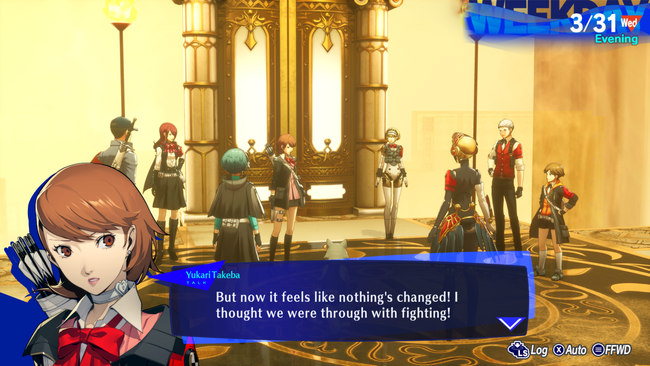
Set shortly after the events of the ending of P3, S.E.E.S. is about to go their separate ways. After the tragedy of the Protagonist’s sudden death, each member is coping with the circumstance in their own way. However, at midnight of March 31st, they find themselves right back at the beginning of the day, stuck in a time loop and unable to escape the dorm unless they traverse a desert of doors leading to shadow-filled dungeons.
On a pure surface level, the presentation continues to be top-notch. The dungeons look good, battles are flashy, animated cutscenes maintain the level of quality they had in the base game, and the new music is just outstanding. Several remixes on old tracks feel like improvements in many instances, or at the very, least more consistently equal to the originals than before. The new Mass Destruction is a standout, and there might be a case to make for it being better than the new battle theme “Don’t”. Do I wish to make that case? Not necessarily. I don’t take sick pleasure in making two Mona Lisa’s fight.
When I was playing Persona 3 Reload, I had a lingering thought in the back of my mind while roaming the floors of Tartarus, something along the lines of: “I love playing this game, and I wouldn't mind a game that focused more on the combat and dungeon crawling.” While not exactly what I was asking for, Episode Aigis almost delivers on this request. Because the cast are trapped in their dorm unable to escape, the other parts of the modern Persona formula are not here. You are dungeon crawling, and that’s it. You can take breaks, stock up on supplies, or chat with friends on occasion, but I’d say roughly 95% of this game is just running randomly generated dungeons or fighting battles.
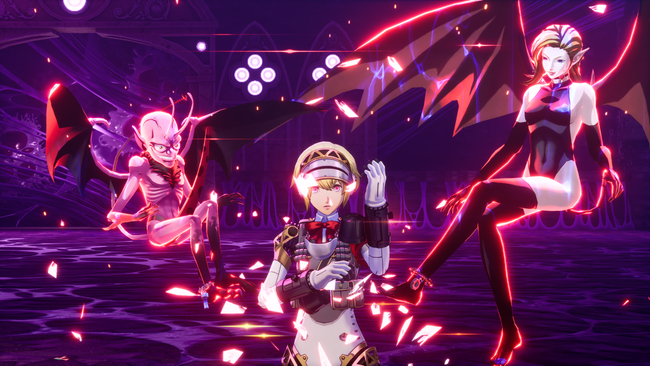
Did you love Persona 3 Reload’s dungeon crawling? Like, really and truly love it? Was “P3R rogue-lite” on your bucket list like me? You’re going to be at home, it’s just more of that. “More” is the keyword. Episode Aigis isn’t an evolution of P3R’s mechanics, but just a minor tune-up. You are playing a slice of a Persona game in a microcosm, experiencing the same progression condensed to a game that’s about half the length.
Leveling is faster, there are more battles, everything is harder. Your characters all start at level 30 with their late-game personas, and from there you’ll need to regain your power as you fight harder and harder enemies. I tried to compare stat screens between my old save and my new one, and if there were any serious character rebalancing then I guess I missed it. Characters like Akihiko and Mitsuru still feel “nerfed”. They’re useful early on thanks to having their better personas at an early level, but fall off near the end.
Despite there being no concrete new additions to the general combat formula, what it seems like Atlus did instead was just retune everything around it. My biggest critique of P3R was that it felt that it was too easy, even when running through it in hard mode. I don’t really mind that the Persona series has trended towards lesser friction, accessibility, and making games that are just more fun overall, but Reload felt undertuned in this regard. Episode Aigis gives people an experience more in line with the original The Answer, at least a little bit. You can freely change your difficulty, still, but all of them will be quite a bit more difficult than what you had to deal with in the base game from the outset.
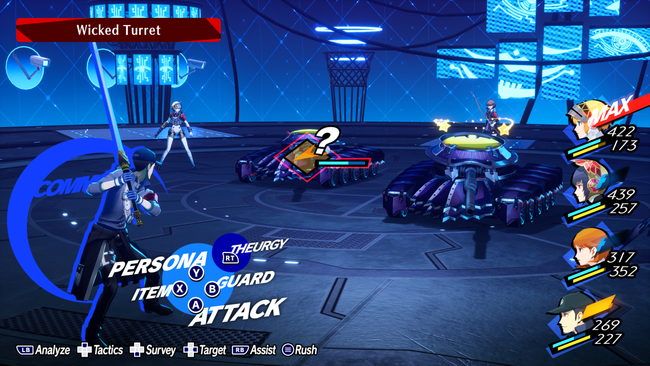
As an important note while I discuss the difficulty: the review code offered by Atlus was only for the Xbox/Windows version of the game. My initial playthrough was on Steam, so I was not able to carry over my compendium. I started this epilogue with none of the expected bonuses most players will have when they boot this up. This likely will affect my thoughts on the difficulty that may not apply to most players who have a save file to carry over, but I ultimately think it may actually have improved my enjoyment.
I initially decided to start on Normal just to gauge how it felt, since as I mentioned previously this experience was previously always locked to hard. I was pleasantly surprised to say it felt perfect, comparable to hard mode in Reload. Decently challenging, punishing people who aren’t paying attention. I would then switch back and forth between Normal and Hard as I went, finding that mode to be great as well. It goes to show just how great Reload’s foundations are when put in a game with more bite to it.
This was a pretty smart way of handling this, I think. As an RPG epilogue, I want it to build off of Persona 3 and feel like a continuation in both themes and gameplay. They delivered on this. It leads to a much better-balanced experience, and probably some of the most fun I’ve had with a modern Persona game. The amazing game feel, but balanced around pushing your tactics as far as they can go? Letting the user tweak how much challenge they want depending on their preferences while still making each difficulty all harder comparatively to the base game? That’s the definition of a well-balanced RPG in my book.
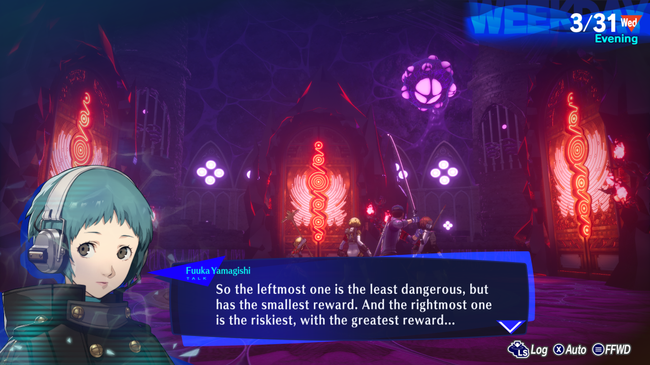
There’s this mean attitude in the challenge on offer that you don’t really get as much with Atlus RPGs anymore that I absolutely loved, with it becoming more and more demented the deeper you get. After a certain point basically every boss will have a skill that gives them a decent chance of dodging their weakness. More and more enemies will reflect or resist most attacks. In the end game, when most of your party deal their best damage with physical attacks, enemies start to have more and more physical counter skills that can instant K.O. Junpei with his own move at full health if he gets unlucky. Monad Doors show up a lot more often, offering three doors of different difficulties with the promise of more loot behind the harder doors. Death in these will be run killers with no retry options, and the better gear you find in here won’t even give you an advantage for long, either. It can be deliciously cruel, and I was truly hooked.
There is a concession for fans of more of the social aspects of Persona than the turn-based gameplay, outside of just letting people turn the game down from hard. The Characteristic system you could gain for party members in the base game has been carried over, tied to special items found in chests that can be open for twilight fragments at the end of boss fights. The item can then be brought to specific people to be used as a conversation piece. None of these scenes are crucial, but I think it’s nice to see the group spend time together on their breaks. My favorite of the bunch would probably be Metis forcing Ken to brew pour over coffee, and then discussing what it would even mean for a robot like her to taste it.
However as much as I love the random generated dungeon crawling, the sheer scope of this expansion can be overwhelming. My playthrough was about 30 hours long, and by hour 20 I was beginning to burn out. Dungeon designs have a tendency to repeat in each of the seven dungeons. I don’t think this is as much of a criticism, especially if you pace yourself and don’t try and blast through what is essentially a small video game in the course of a week. It does show though that no matter how much I enjoy the gameplay of a modern Persona, Episode Aigis feels a bit lopsided without the variety and pacing the day to day sections are. With cutscenes being few and far between, I think many people may lack the tolerance for this that I did. I’m a bit mad at myself that I wasn’t able to stretch this out to the month I’ll spend hungrily waiting for Metaphor ReFantazio, because if so I’d probably be willing to say with my full chest that this is the best time I’ve had with the gameplay of a modern Persona title. Give me some time to reflect though, I’ll probably still get there eventually (after I make up for lost sleep).
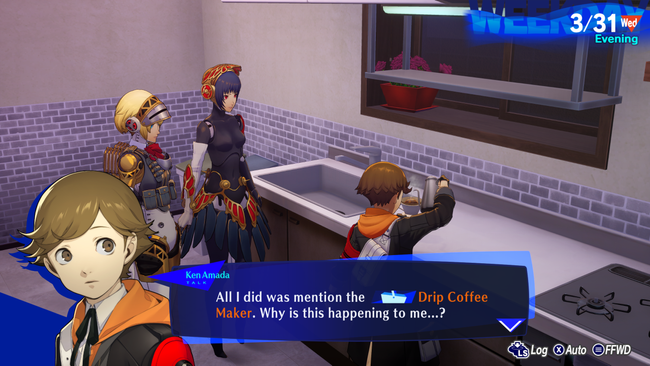
I haven’t seen The Answer’s story in quite some time, but I’m honestly not sure why it has the reputation it has developed. This is a story about dealing with grief, about accepting the death of a loved one and finding the strength to somehow move on from it. While the events to put our characters in this situation might be seen as flimsy, I think they’re worth it just so we can have a narrative that is more of a character study than what we got in the original P3. It can be deeply uncomfortable at spots, with an emotional rawness that will often take you off guard if you’ve ever had to go through something similar. Admittedly, I was not able to relate to this as a teenager as well as I can now. How these characters deal with this trauma highlights basically the entire spectrum of reacting to grief. I was really only able to appreciate it with a decade of hindsight. The writers really make the cast bare their souls here.
The English voice cast especially brought their all to sending these characters off, with heart-wrenching performances that will go down as some of the best in this franchise. Dawn M. Bennett’s Aigis and Heather Gonzalez’ Yukari in particular stole the show, and Zeno Robinson’s Junpei bringing the subtle maturity to that character crucial to making him work in this story.
However, while most of the game adapts the story basically 1:1 (even going as far as having scenes play out the exact way), there were some changes near the end that I’m a bit mixed on. I can’t go into specifics, but after a certain key point, I’d say a stretch of the game feels a bit toned down. There are no massive plot changes, and things ultimately play out the same as before, but I noticed a lot of reframing of character motivations. It seems like they tried to respond to a common piece of feedback I’ve heard for years that the cast felt out of character, and changed up dialogue to make their perspectives more clear. Some characters get a bit more to work with, others come across as similar on the whole but distinctively different. One of the best animated scenes in the original game however got a massive change to it that kind of feels baffling. I want to call it sanitized, but it’s so different that I’m more curious than anything why they did it.
Episode Aigis is a peculiar expansion, with most of the eccentricities of its PS2 counterpart seemingly intact. I think the best part about this expansion is how it uplifts its story by simply surrounding it with gameplay more people are likely to enjoy. I can’t believe there was ever a time that I felt this was just tacked on, because this feels like the final puzzle piece to deliver Persona 3’s themes home. As a video game, this fired on basically all cylinders I needed it to. I’m unsure about some of the minute story tweaks, but I lean positive overall because I think it’s a deeply mature look into one of the worst tragedies someone can experience. You could end your journey with the credits of Reload and have a satisfying story, but Episode Aigis drives it all home. Persona 3 is one of the most thematically dense stories Atlus has ever told, and if you fell in love with this case as much as I did I think you’ll find value in seeing where they go from here. It won’t appease every Persona fan, but it did this one. Just maybe take your time.
Versions tested: Xbox/Windows.
Disclaimer: A copy of this game was provided to RPG Site by the publisher.